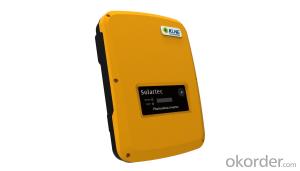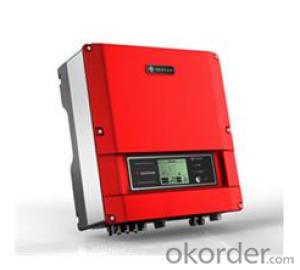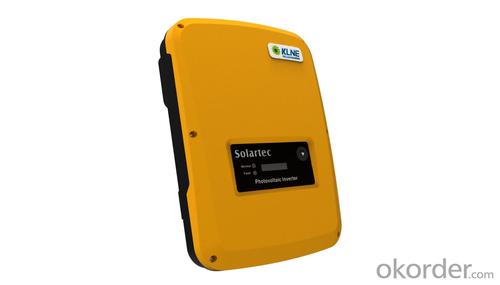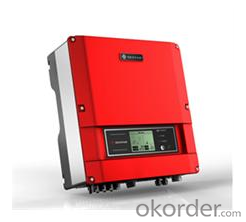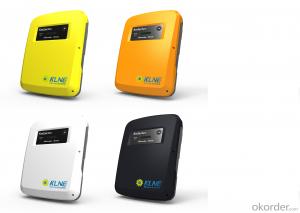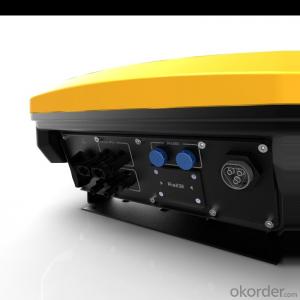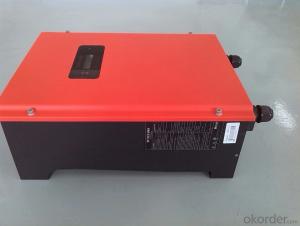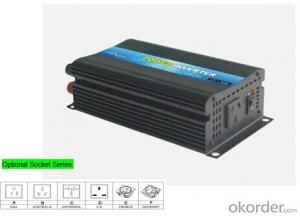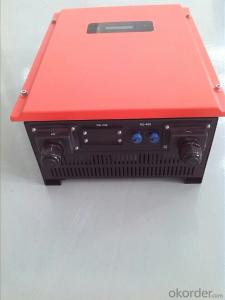300W Solar Inverter Off-Grid Type Solo-70 Series
- Loading Port:
- Shanghai
- Payment Terms:
- TT OR LC
- Min Order Qty:
- 10 unit
- Supply Capability:
- 1000 unit/month
OKorder Service Pledge
OKorder Financial Service
You Might Also Like
Product Description:
This system can keep 3 energy-saving bulbs with 11W working for 6 hours per day and a 5W radio working for 5 hours a day.
Output voltage:5V d. c. (USB port) / 12V d. c.
It can work for 3 successive rainy days.
● System voltage:12V
● Power:70W ● Dimensions of box:475*250*365mm ..
● Net weight of the box:9kg .
● Output DC current:5 phases..
● Charge and discharge current:10A..
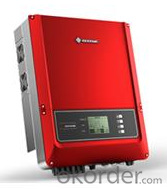 Product Advantages:
Product Advantages:
Product Advantages:
Powered by DC current
Can used out of doors
High effiency and low noise
FAQ
What is your payment terms?
We accept T/T payment, normally we need 20% T/T in advance, 80% payed before shipment.
What is your packing system?
We put the sistem in the wooden box.
Can you do OEM service?
Yes we can, but we need to do it with a certain order quantity.
- Q: What is the difference between a string inverter and a micro inverter?
- A string inverter is a type of inverter that is connected to a string of solar panels, converting the DC power generated by the panels into AC power for use in the electrical grid. On the other hand, a micro inverter is a smaller and individual inverter that is attached to each solar panel, converting the DC power directly at the panel level. The main difference between the two is that a string inverter operates at the string level, which means if one panel in the string is affected by shade or malfunction, the entire string's performance is affected. In contrast, with micro inverters, each panel operates independently, allowing for higher energy production and better performance in situations where panels are subjected to shading or varying conditions.
- Q: Are there any safety concerns with solar inverters?
- Yes, there can be safety concerns with solar inverters. Some potential issues include electrical shocks from improper installation or maintenance, fire hazards due to faulty wiring or overheating, and electromagnetic radiation. However, these risks can be minimized through proper installation, regular inspections, and adherence to safety guidelines and regulations.
- Q: Can a solar inverter be used in areas with high levels of electrical noise or interference?
- Yes, a solar inverter can be used in areas with high levels of electrical noise or interference. However, it is important to ensure that the inverter is designed to handle such conditions and has appropriate noise filtering mechanisms in place to minimize any potential disruptions or damage caused by the interference.
- Q: PV grid-connected inverter can directly load it?
- TL5001 operating voltage range of 3.6 ~ 40V, its internal with an error amplifier, a regulator, oscillator, a dead zone control PWM generator, low voltage protection circuit and short circuit protection circuit
- Q: How does a solar inverter handle voltage fluctuations from the solar panels?
- A solar inverter handles voltage fluctuations from the solar panels by continuously monitoring the incoming voltage and adjusting its own output voltage accordingly. It employs a control mechanism that stabilizes the voltage to ensure compatibility with the utility grid or the connected appliances. This enables the solar inverter to efficiently convert the variable DC voltage from the solar panels into a stable AC voltage, maintaining a consistent and reliable power supply.
- Q: Can a solar inverter be used in a ground-mounted solar system?
- Yes, a solar inverter can be used in a ground-mounted solar system. The solar inverter is an essential component that converts the direct current (DC) generated by the solar panels into alternating current (AC) that can be used to power electrical appliances or be fed back into the grid. Whether the solar system is mounted on the ground or on a roof, the inverter's role remains the same, making it compatible with ground-mounted systems.
- Q: How does a solar inverter handle frequency variations?
- A solar inverter handles frequency variations by continuously monitoring the grid frequency and adjusting its own output frequency accordingly. It maintains a stable and synchronized frequency by using advanced control algorithms and power electronics to ensure that the electricity generated by the solar panels matches the frequency of the utility grid. This allows the inverter to seamlessly integrate renewable energy into the existing power system without causing disruptions or damage.
- Q: Can a solar inverter be used with a three-phase power system?
- Yes, a solar inverter can be used with a three-phase power system. In fact, many solar inverters are designed to work specifically with three-phase power systems. These inverters convert the DC power generated by solar panels into AC power that can be used by the three-phase electrical grid.
- Q: How is a solar inverter different from a regular inverter?
- A solar inverter is specifically designed to convert the DC (direct current) electricity generated by solar panels into AC (alternating current) electricity that can be used to power household appliances and be fed back into the grid. On the other hand, a regular inverter is generally used to convert DC power from batteries or other sources into AC power. Therefore, the main difference lies in their purpose and the source of the DC electricity they handle.
- Q: Can a solar inverter be used with a single solar panel?
- Yes, a solar inverter can be used with a single solar panel. The purpose of a solar inverter is to convert the direct current (DC) produced by the solar panel into alternating current (AC) that can be used to power electrical devices or be fed into the electrical grid. Even with a single solar panel, the inverter can still perform this function effectively.
Send your message to us
300W Solar Inverter Off-Grid Type Solo-70 Series
- Loading Port:
- Shanghai
- Payment Terms:
- TT OR LC
- Min Order Qty:
- 10 unit
- Supply Capability:
- 1000 unit/month
OKorder Service Pledge
OKorder Financial Service
Similar products
Hot products
Hot Searches
Related keywords
